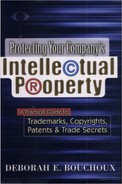The Need for a Patent Search
Because of the expense and time involved in preparing and filing a patent application, inventors should not risk filing an application only to have it rejected for lack of novelty or for obviousness. Thus, examining the prior art is critical before filing an application for a patent. Filing a patent application without conducting a search of the prior art is like leaving home for a long road trip without a set of directions. Additionally, searching patent records provides an overview of the competition and usually provides meaningful guidance on preparing the patent application so it meets with the fewest possible objections from the PTO.
Although the PTO provides a public search room for patent searching, searching prior art takes a great deal of experience, expertise, and familiarity in the field to which the invention relates, so searches generally are conducted by experts. Nevertheless, suggestions for searching are provided on the PTO's Web site at www.uspto.gov, and the site affords access to the PTO's own collection of more than 6,500,000 patents issued since 1790, which can be searched by inventor name, patent number, or topic field. Additionally, the PTO maintains Patent and Trademark Depository Libraries throughout the United States, which include collections of issued patents. The PTO Web site provides addresses for these approximately eighty libraries. Free sources for searching issued patents are provided at www.delphion.com and www.lib.utexas.edu. Coverage includes all U.S. patents since 1971. Users can search by keywords describing the invention, inventor name, or patent registration number.
Although searching these databases will disclose issued and expired patents, it will not disclose references to inventions in publications such as journals and conference papers. Thus, most inventors retain the services of a law firm or professional search firm to review not only patent records but also publications that may bear on novelty and nonobviousness. Engaging legal counsel affords additional advantages because not only are the actual results of the search provided to an inventor, but the lawyer or firm issues a written availability opinion discussing the chances of obtaining a patent for the invention.
In addition to the novelty search, many inventors request that an infringement search be conducted. An infringement search is more involved than a novelty search, and the results detail whether the invention might infringe that of another party. A formal written opinion discussing both novelty and infringement often costs between $1,000 and $5,000 but may well be worth the cost, particularly because obtaining advice of competent counsel may protect an inventor from having to pay punitive damages in a later infringement action because it shows that the inventor acted with due diligence rather than willfully and recklessly. Professional patent searchers can be found by using telephone directories. Most are located in the Washington, D.C., and northern Virginia because of the greater accessibility of PTO records and publications maintained at the Library of Congress.
Some inventors adopt a middle course, searching the free PTO or IBM databases as much as they can. If their preliminary search shows that the invention may qualify for patent protection, they then retain the services of a law firm to broaden the search and provide an availability and infringement opinion.
